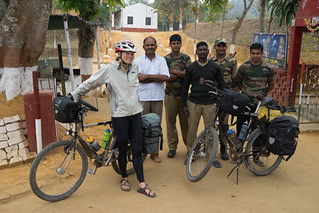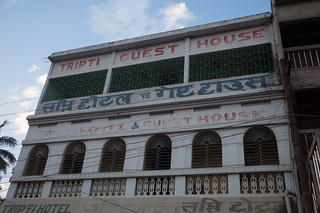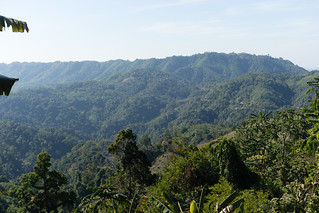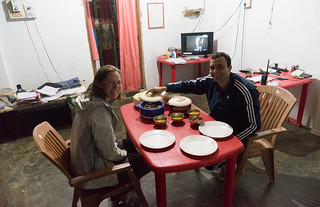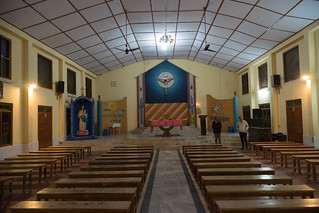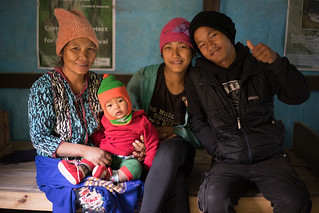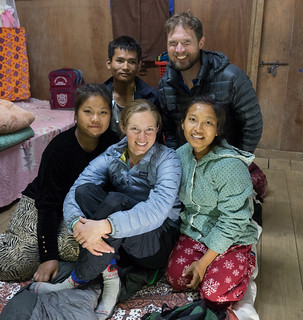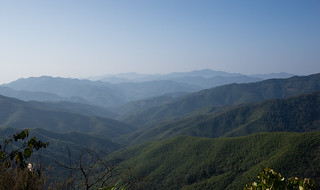A trip of this length and variety gets integrated strangely into the psyche and memory. Time stretches and contracts—Turkey feels more present sometimes than, say, Nepal, and I wonder if it’s because everything was so fresh and new then. Every event, each new place, person, or experience, warranted a reaction; we talked about it, processed, reflected, wrote. When we realized the other day that there was about the same amount of time remaining in our trip as we had spent in Turkey, we were both alarmed to realize how long that time seemed when we were there—and how it doesn’t seem like much time at all going forward.
Our points of reference for have become other parts of the trip, rather than our lives in the US. When I’m hungry, I’m just as likely to fantasize about Georgian katchapuri as a Mission burrito; the absence of alcohol in Bangladesh reminded us of Turkey; when we couldn’t find Internet, we reflected fondly on China’s ubiquitous Wi-Fi (though we didn’t miss its censorship). One element we find repeating from country to country is being able to predict what people are going to say to you and having fun pre-empting them. In Uzbekistan, we could tell somebody was going to ask us where we were from before they opened their mouth. In Russian, this question is boiled down to one word: “Atkuda?!”, often preceded by a grunt. This question was shouted out at us constantly, everywhere we went, with no greeting or follow-up, expect the occasional, wide-eyed “Ooh, America!” At times, weary of the constant “Uhh! Atkuda?!” I would beat people to the game, turning and yelling “Atkuda?” to them before they had a chance to ask me. This practice, which I called “Atkuda’ing” somebody, always resulted in everybody having a good laugh and distracted me from the weariness that long-term travel can create.
In India, the conversation was a bit longer and often included a photo op, and was played out many times a day with men on motorcycles who would roll up alongside us as we rode along the highways of Bihar, West Bengal, and the more populous parts of the Northeast. One day, in the flat plains of Assam, David “atkuda’ed” a pair on a motorbike, inverting the entire standard bike-touring-in-India conversation. Before the men could ask us questions, David asked, “Where are you from?” “Silchar,” they responded. “Oh, very nice. We liked Silchar. Where are you going?” “What is your name?” The guys answered politely and were put off for a moment, perhaps forgetting that they were the ones with questions, and they rode quietly behind for some time before pulling alongside us again and asking those very same questions back, as we’d anticipated.
Auto-repeat conversations notwithstanding, we’ve enjoyed the Northeast immensely. It doesn’t feel like India—this isn’t to say we didn’t enjoy the “mainland” for its own merits, but I will admit that we’ve found the Northeast to be far more relaxed and comfortable than Bihar or West Bengal. Perhaps most striking is the population density. When we crossed from Bangladesh into Tripura, we immediately felt like we had more space. Agartala, the Indian border town, was laid back and friendly—I walked around by myself after dark for the first time in weeks, and was delighted to notice other women, with families and unaccompanied, out in the streets. Going out alone wasn’t forbidden in Bangladesh, but it was strongly discouraged in Bihar, and I’d just gotten used to not really leaving wherever we were staying after dark. In Agartala, I’d been running errands alone for about half an hour before I realized how novel it was to be out and about without David, especially at nighttime.
After leaving Agartala, we started climbing almost immediately. They were modest hills, around 200 meters, but as we rode higher we noticed in astonishment that we were the only people around—the hills were covered in protected forests and there were no settlements, just the occasional paramilitary camp. I should note that paramilitary is the term for government armed forces outside of the regular army, tasked mainly with domestic issues. In the Northeast, these issues are extremists, or Underground Groups (“UGs”). When we read the Lonely Planet’s section on Manipur, the state that shares a border with Myanmar, we learned that it is “… by far the most dangerous state in the Northeast.” It goes on to say that foreigners are only allowed in the capital city of Imphal, and even then you need a special “Inner Line Permit.” Fortunately we’d consulted more recent sources, which said that you no longer needed this permit. We also asked police and paramilitary we encountered along the way, who all bobbed their heads side to side and said “safe, safe” when we asked about the road ahead. Several people, though, cautioned us to get off the road before dark and to stay in hotels rather than camping. So we took their advice and spent a few nights in hotels of varying quality as we rode from Agartala to Silchar, the last proper town before Imphal, several days away.
One night we stayed at a guesthouse that advertised “fooding and lodging,” one of many amusing phrases we’ve encountered in India. And at that hotel we indeed felt “fooded” when we sat down in the hotel’s restaurant and within seconds, before we had a chance to order, plates full of rice, dhal, and vegetable curry were plunked under our noses, with a man vigorously wielding a ketchup bottle close behind. Another night, we were woken at 4:14 AM by dueling “music” emanating from nearby temples. Some other people in our modest cement cellblock hotel were also up, and we asked them what was going on. They shrugged. Still half asleep, David asked in distress, “How is this OK???” I consulted the Internet to see if there was a Hindu holiday, but found nothing. Fortunately, David remembered that he had an album on his computer titled “Natural White Noise for Babies: Help Your Baby Sleep Through the Night,” which he’d downloaded when stranded overnight at an airport. We put it on repeat, and, like babies, we slept the rest of the night despite the high-volume performances down the street.
After five relaxed days of riding in Northeast India we reached Jiribam, the town on the Manipur state border. While the police at most other checkpoints had casually waved us through, this one stopped us and directed us inside a small hut on the side of the road. They got out a form, layered it with carbon paper and additional sheets, and filled out all of the details from our passports. We held our breath as they took down David’s information, as there was an error in his visa that had given us problems before. Nonetheless, they completed the paperwork without incident and called in a well-dressed man to stamp and sign our passports. A state stamp! This was new. The man directed us to report to his headquarters in Imphal, the state capital, but despite efforts to clarify I didn’t know if this was mandatory or a mere suggestion. We ended up not registering anywhere in Imphal, and nobody ever asked us about it as we rode to the border with Myanmar, so it must not be required. During the process they served us delicious tea and snacks—some of the best samosas we’ve had—and also called a hotel owner for us. We had heard there were no hotels in Jiribam, so we were relieved when they told us there was one. Well, it turns out there is an entire block of them, so we could have just ridden down the road and taken our pick. However, at 300 rupees (about five dollars) our room was reasonable, and we liked the owner, a young guy who spoke good English and thought our bike trip was crazy, but admirable.
We also asked the police about the road ahead—both about extremists and places to stay. They repeated what we’d heard before: the road was safe during the day, but find somewhere—with security, our hotel owner added—to sleep inside at night. I had looked at Google Maps back in Dhaka and plotted out distances between the towns that showed up on the map. It was 89 km from Jiribam to the first town, then 49 km and 64 km. The road was in bad shape, though, and we were happy to learn that there was a small town called Barak with a paramilitary station about 75 km away. So we made that our target and had a serene day of riding, first up a mostly paved road to the friendly town of Kaimai, then a beautiful 20 km descent, right at the perfect time for riding—an hour before sunset when the air is cool and the light is sublime—sailing downhill through bamboo-covered mountainsides.
When we got to Barak, we started asking around about a place to sleep. The townspeople immediately directed us to the paramilitaries, who were flustered at our sudden appearance on bicycles, without a word of Hindi between us. They called their commanding officer, who got up from his post-patrol nap and strode down the walkway in a blue Adidas track suit to meet us. He spoke decent, distinctly Indian, English, and invited us up to a little gazebo and asked to see our passports. He asked for our names and phone number, what we needed, where we were going, and whether we wanted tea or coffee. We told him we were on our way to Imphal, and he startled us by saying “That will not be feasible.” Soon, though, we understood that he was telling us we couldn’t go on that night. We agreed and told him that was why we had stopped in front of his station—we needed a safe place to sleep, and wanted to know if we could pitch our tent in their camp for the night. Of course, we could not camp, he said, and he wasn’t allowed to let outsiders stay there, but fortunately none of his superiors were on site, so he would gladly make an exception and host us. And host us he did—we had a delicious dinner, with chicken curry made just for us (he is Hindu, and a strict vegetarian), rice, dhal, and chapati. He brought out a bottle of whiskey and turned on the TV. We watched Bill Bilichek’s Deflate Gate press conference, and then Schwarzenneger’s “The Last Stand.” Or, rather, David stared blandly at the television, distraught over the Patriots’ scandal, while I told our host everything he wanted to know about the US. He asked whether we had anything like the caste system—social classes based on race, location, or income—and I was so excited to be straying from the usual “Where are you from? Where are you going?” conversation that I talked his ear off about how America is based on all these great ideals regarding equality, but that there are still huge problems around race, class, and inequality. It’s probably not what he was expecting. I also tried to use this opening to ask questions about caste, but it is still a big mystery to us.
We spent the next night in great luxury—we arrived at a small village near sunset, and after we found somebody who spoke English, we were directed to a nearby Catholic Church. We rode down a steep driveway past some friendly teenage boys playing soccer, and when we got to the church’s porch, a young man welcomed us and went to get “Father.” Father William appeared, beaming, and introduced himself. We explained our situation and he immediately led us upstairs and showed us to a room with two beds and a bathroom. It felt as if he was expecting us; the church has a few guest rooms for visitors, and we had one of our most enjoyable and comfortable nights in India. We had dinner together after Father William said grace—we felt lucky to receive a blessing from a priest, especially when he asked for a safe journey for us—and we peppered him with questions about Catholicism in India and the history and present status of the Northeast.
The conversation was greatly enriched by the fact that he speaks perfect English (as well as four other languages) and did his PhD on the socio-economic history of his tribe, the Mao Naga. It was another one of those surreal moments—who would have thought that we would stumble upon a penta-lingual Catholic priest historian in the middle of Manipur, a place we’d only heard of a few months before as we charted our route, described only as “green, mountainous, and dangerous.” Father William runs a school for children in his parish, which helps explain why so many of the young people in the area speak such good English (often they shyly say no if you ask whether they speak English, but proceed to answer all your questions clearly). It was fascinating for us to talk with this man who is so committed both to his Western-origin religion and to the preservation of his Naga culture. I read the last chapter of his dissertation, which helps explain how the two aren’t necessarily at odds; it speaks of eco-spirituality, invoking Christian principles to preserve the land, and also discusses how Christianity needs to adapt to the local context, both to bring people over to the faith, and to become more relevant and serve them better.
He never asked our religion; we both grew up in nominally Christian families, but are no longer practicing and if asked for one word to describe our religion, would probably say “agnostic.” Nonetheless, after nearly nine months in Muslim, Buddhist, and Hindu countries—with the exception of Georgia—it felt good to be among Christians, something I never thought I would say as I don’t really identify with the faith. He showed us into his church, and while I feel and appreciate the beauty and holiness of mosques, temples, and stupas, there was something comforting in the familiarity of this church—the modest wooden benches, high ceiling, and alter, covered in traditional cloth but adorned with symbols I recognize from my long-ago church-attending days.
The next day, we gave ourselves a nice, slow morning, since we were ahead of schedule to arrive in Imphal—a rare occurrence that we savored. There was more climbing, but the road was in excellent condition and we made decent time. Still, we were 30 km short of Imphal around 4:00, the time we needed to start looking for a place to sleep. We stopped in a small village where a young man at a store told us the area was safe and that we could stay in the village that night if we needed. We then encountered an older man who said there wasn’t anywhere to stay in the village, but that there was a military post two km down the road. We proceeded to the military post, but it wasn’t very welcoming, set on a barren hillside behind rows of barbed wire with stern-faced soldiers at the gate. So, we did something we almost never do—we turned around.
As we approached the village for the second time, we stopped to greet a man and woman walking up the road. “Welcome,” said the woman, extending her hand. When we asked about a place to sleep, she pointed down the road and said there was a guesthouse. We walked back into the village together, where we again met the older man, who raised an eyebrow and asked why we hadn’t stayed at the military post, as there really wasn’t anywhere for us in the village. Normally this would have made me uncomfortable—I hate forcing myself on people, demanding hospitality, but there was something so relaxed about the place, the music wafting out of one of the houses, the welcome we’d received from everybody else. So we just smiled and let our new friend talk to him, and within a few minutes he’d disappeared, then reappeared with a set of keys.
He unlocked a room next to the market, and voila—two wooden beds, room for the bikes, the perfect home for the night. We spent the rest of the evening with our new friend and her daughter Tracy, who visited us, along with all her friends, before and after bible study. We’d landed in a Kuki village. As we learned later, most of the villages at the tops of the mountains in Manipur are Kuki, and they are Baptists. Tracy and her friends watched us cook and eat our noodles; they showed us their bibles, written in Kuki, and one of her friends shared that his dream was to preach the gospel. He asked us our favorite bible verse and I think our poor Christian credentials showed when we couldn’t answer. It was a lovely little town of about 190 people, with adults and children drifting in and out all evening. The next morning, our nominal host knocked on our door at 6:00 to say goodbye before boarding an auto-rickshaw to attend a meeting. Later, after another meal-with-audience, we bid our friends farewell and rode the rest of the way to Imphal.
In Imphal, we were hosted by the members of Pedal Attack, a local cycling group that hosts travelers through WarmShowers. David interviewed a few members, and you can learn more about their group here (https://www.facebook.com/Pedal.Attack). They took us all around, showing us Loktak Lake, the War Cemetery, and a local Hindu Temple.
After three days, we left Imphal for the final push to the border. We got a late start after changing money (we needed dollars for Myanmar, as well as rupees, which we’d heard you could change at the border), going grocery shopping, and getting a few bike parts from our friend’s store. We rode 50 km on the perfectly flat plain that surrounds Imphal, and then started climbing. At 4:15 and 1200 meters in elevation we found ourselves in another Kuki village. We asked some teenage girls at the local shop about a place to stay, and before we knew it we were sipping tea with them. They put us up in the shop owner’s house, and we made dinner as they looked on—they told us they only eat twice a day, at 8:30 in the morning and 4:30 in the afternoon, and that they weren’t hungry. Still, we felt a little strange eating in front of them, but they were busy texting friends and listening to music—we discussed Justin Bieber and Miley Cyrus and played music for each other on our smartphones. Afterwards, we shared some chocolate with them and went to bed.
Kuki people get up early, and so did we, but with all the farewells we didn’t get on the road until almost 7:00. We were further slowed by the many checkpoints as we approached the border with Myanmar. At several points we were required to dismount and hand over our passports. Data was entered, supervisors called, and then we were waved through. At the last point, we were subjected to a lengthy interview by one “Major Rocky”. We concluded that he must be terribly bored—in addition to our passport details, he asked—and recorded—every country we’d visited, interjecting his own commentary and asking extra questions. How did we like Indian food? Did we like Obama? So did he, but until recently Putin was the bigger man. What is our profession? Ah, environment! There are other ways to save the environment, in addition to cycling, no?. We met another traveler later who had a similar experience, though he was also treated to the Major’s entire regiment parading and saluting. We felt a little cheated.
In the border town of Moreh, we printed out our permit to cross the border, which had arrived in an email earlier that day. We had lunch, then crossed our fingers and cycled to the final checkpoint. Actually, it wasn’t that straightforward. First we were accosted by a man with a thermometer who insisted he needed to take our temperature to make sure we didn’t have Ebola (we didn’t). Then we had our passports inspected by another military official at the “land customs office,” and then we nearly missed the large white building by the side of the road, where upon our arrival a surprised-looking man, neatly dressed in a button-down shirt, rustled up some stamps and ink (he had to fetch a backpack from another room) and stamped us out of India, taking no notice of the extra “2” in the passport number of David’s visa. In another room we filled out a customs form, and then biked the remaining kilometer through no-mans-land to the bridge that would take us to Myanmar.







